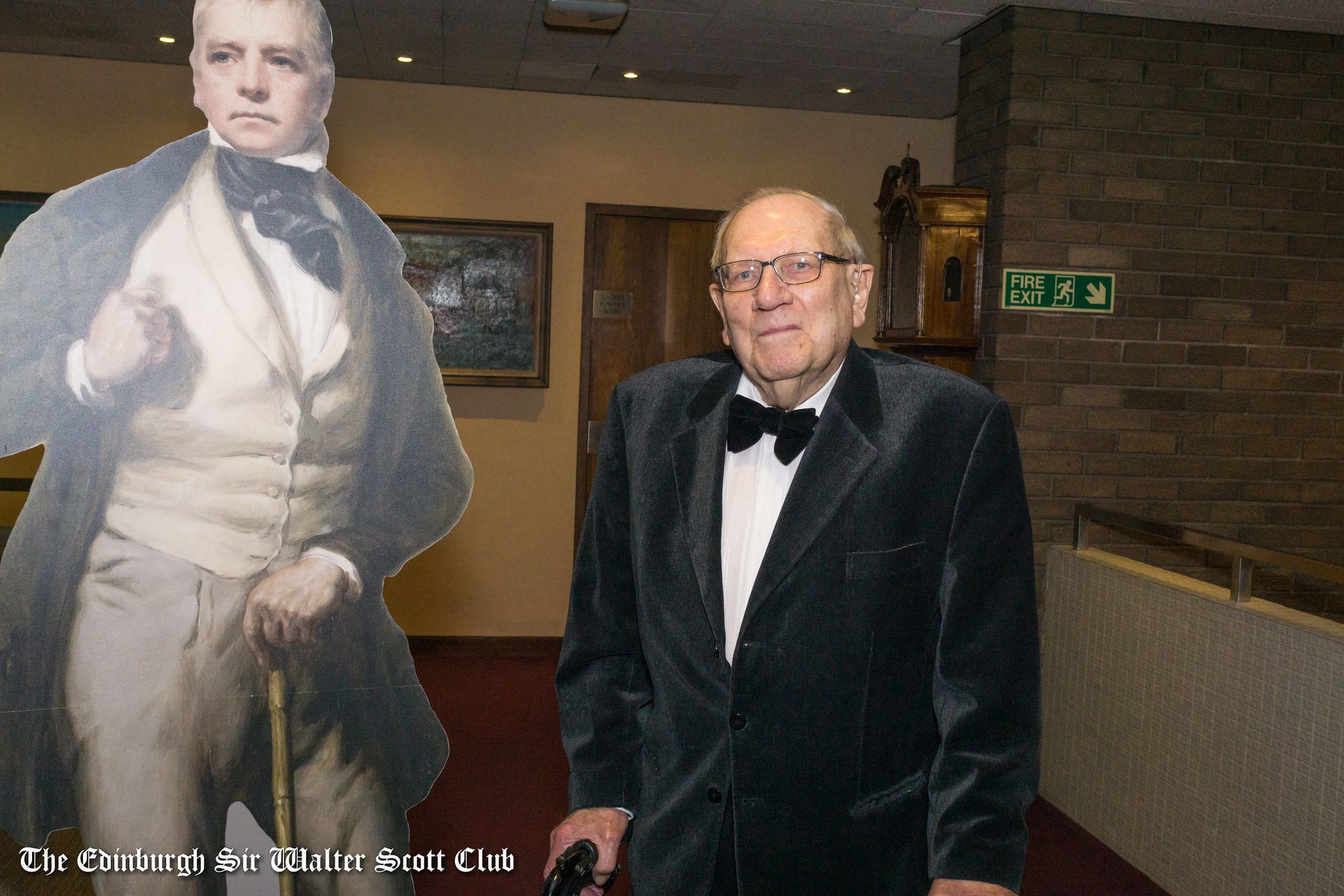1995
Our President in 1995/6 was:
Paul H. Scott
He proposed the Toast to Sir Walter at our 87th Annual Dinner on Friday 2nd March 1996 in The Balmoral Hotel, Edinburgh
Download the [transcript] or read it in the [bulletin]
Summary of the Talk:
The speech was a heartfelt toast to Sir Walter Scott, reflecting on his profound influence and legacy.
Paul H. Scott began by sharing his personal connection to Scott’s work, recalling his early exposure to Scott’s novels and his deep admiration for them. He emphasized how growing up in Edinburgh, similar to Scott, made him feel particularly connected to the author. He discussed the widespread admiration for Scott's work, from international figures like Goethe and Pushkin to local admirers like George Eliot. He also acknowledged the scepticism and criticism Scott faced during his life and in modern times, particularly regarding his portrayal of history and political affiliations.
Paul H. Scott expressed his dismay over the modern dismissal of Scott's contributions, especially in his own homeland of Scotland, where Scott has been unfairly criticized. He discussed how Scott’s work—especially the Waverley novels—had deeply influenced perceptions of Scottish history, promoting a nuanced understanding of Scotland’s past, despite some claims of "deluding myths" about Scotland’s history.
Paul H. Scott also touched on Scott’s political leanings, describing how Scott's personal and political views aligned with the Tory party during his time, but he was not narrow-minded or rigid in his beliefs. He cited Scott's passion for Scottish identity and his commitment to preserving Scotland’s culture, even if it meant fighting for its independence in an era when such notions seemed lost.
He ended by addressing the recent shift in opinions on Scott's legacy, pointing out how some scholars and critics had downplayed his contributions, focusing instead on the negative aspects, such as his perceived defeatism and his influence on national symbols like tartan. In contrast, Scott argued for a reassessment of Scott's contributions, not only to literature but also to Scotland's national survival and identity.
The speech concluded with Scott calling for a toast to Sir Walter Scott, acknowledging that Scotland owed so much to him, both for his literary works and his role in shaping Scottish national pride.
Interesting Points:
- Personal Connection: Paul H. Scott shares a personal and nostalgic connection with Scott's works, even recounting his first significant book purchase—a Melrose edition of Scott’s novels.
- Scott’s Global Influence: The toast emphasizes Scott's worldwide admiration and the lasting impact of his work across different nations and cultures.
- Criticism of Modern Views: He strongly critiques the modern dismissal of Scott's work, particularly in Scotland, where he is sometimes wrongly dismissed as promoting delusions about Scottish history.
- Scott’s Political Complexity: Het acknowledges Scott’s Tory political leanings but argues that this did not make him narrow-minded or politically rigid, showing that his true allegiance was to Scotland and its people.
- Reassessment of Legacy: He calls for a reassessment of Scott’s literary and national contributions, advocating for his rightful place in history as a key figure in both literature and the preservation of Scottish identity.
This speech is a passionate reminder of Scott’s enduring legacy and the importance of reappraising historical figures in the context of their contributions rather than contemporary biases.

Download the [transcript] or read it in the [bulletin]
Paul Henderson Scott (born 7th November 1920, died 16th March 2019) was a soldier, diplomat and tireless advocate for Scottish independence. He was born in Edinburgh and educated at the Royal High School and Edinburgh University. He was an artillery officer in the Second World War, and from 1945 to 1949 was a military administrator in Berlin. He then entered the diplomatic service and served in many different countries, including Poland, Bolivia, Cuba, Canada, Austria and Italy.
After his retiral in 1980 he returned to Edinburgh and campaigned not only for Scottish independence but also for many related cultural causes, including the establishment of a National Theatre of Scotland and saving the Scottish National Portrait Gallery from closure. At the age of 19 he had joined the then recently established Saltire Society: he was both a President and Convenerof the Society, and engaged in the councils and executive committees of the Scottish National Party, the Campaign for a Scottish Assembly, the Scottish Centre for International PEN and the Scottish Poetry Library. He was also Rector of Dundee University, 1989-91. He wrote numerous books, including Walter Scott and Scotland (1981), John Galt (1985), Scotland in Europe: Dialogue with a Sceptical Friend (1992) and an autobiography, A Twentieth Century Life (2002). He had a lifelong interest in and appreciation of Sir Walter Scott, and produced a new edition of Scott’s Letters of Malachi Malagrowther (1981).
Text source: James Roberton (used with permission)
You may also like: You may also like:
Paul H. Scott: [Rob Roy] (Chapter 27) - Discussions about the Union 6 minutes
Paul was a member of the Council of the Club for 29 years (1984-1989 and 1993-2017) as well as Chairman from 1986 - 1989.
He has also given 3 lectures to the Club:
2014: Paul H. Scott - The Letters to Malachi Malagrowther
2009: Brian Gill and Paul H. Scott - Colloquium on The Heart of Midlothian [bulletin]
2002: Paul H.Scott – Walter Scott’s Cruise with the Lighthouse Commissioners [bulletin]


